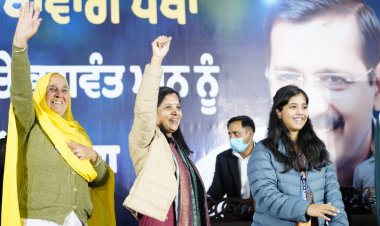The Dharitri Regenerative Agriculture Pilot project, Leveraging Blockchain to empower farmers in Ngarariga, Kiserian and Ruiru for climate resilience

In the face of a widening $150 billion credit gap that prevents smallholder farmers especially in African countries from accessing essential financial tools and the escalating impacts of climate change, a trans formative solution is emerging at the intersection of cutting edge technology and regenerative ecology.
Small and marginal farmers encounter several challenges when trying to access credit and financial services. Firstly, their lack of collateral often makes it difficult for them to qualify for traditional loans as financial institutions typically require tangible assets as security.
The loan application process is also complicated and hard to understand, high interest rates makes loans too expensive and remote locations with poor infrastructure limit access to banking services,
Dharitri Foundation an NGO that is currently doing its pilot project in Kenya has come in to bridge that gap; where farmers form a community group within a specific area and get funded with a 5% loan, money generated from our Blockchain technology platform to grow food in a regenerative way, food that is naturally grown and rid of synthetic fertilizers. Our mandate is to ensure that we save mother earth by employing nature based solutions in farming to protect biodiversity.
This mobile first approach is specifically designed to bridge the gap between small scale farmers in Limuru, Kiserian and Ruiru and the technological tools they need to thrive in a climate challenged world.
Agriculture is very sensitive to weather and climate and it heavily dependent on land, water and other natural resources that climate affects. Farmers have relied on a steady mixture of sun, warmth and rains in order to reliably produce the food that all humanity depends on for survival. Now these once predictable growing cycles area at risk from climate change.
Thomas Njoroge, a farmer in one of the Limuru farms that will benefit from the pilot project talks of how for the entire month of April and July 2025 it has been dry and in his half an acre farm plants have been drying up due to lack of rains.
“Four to six weeks later, it became worse with the frost experienced in Limuru,”says Thomas, a father who supports a family of three with the income from his small farm.”Now, we just pray that the harvest will be enough to fed for the family.”
Uncertainty is a feeling that Njoroge has gotten used to because its the fourth year in a row that weather problems have threatened his family’s livelihood.last year, his harvest was in very low quantities because the rains delayed. The year before, there was a storm that wrecked havoc in the farm where he had planted onions and spinach.
Farmers in Sub Saharan Africa are particularly vulnerable because they mostly rely on rain fed agriculture instead of irrigating. In Kenya, the rain season typically lasts from November through April, after which the weather becomes too cold or too hot to support growing food successfully. Every year, farmers need to produce enough food from their single annual harvest to feed their families until the next season, having this in mind then. Dharitri opted for the regenerative agriculture practice where we are not only relying on one single crop but also using rotational method to ensure that farmers have enough harvest in our circularity model.
Following the key principles in regenerative agriculture like, composting, cover cropping which helps build organic matter. Not forgetting reduced till practices which maintain soil structure and protect vital micro organisms
Dharitri’s pilot project in Ngarariga Limuru, Kiserian Kajiado, and Matangi in Ruiru represents a practical implementation of the powerful synergy between blockchain technology and regenerative farming practices. The project creates a closed loop system where ecological benefits are verified, valued and compensated through technological innovation. The seeds to be planted in the farms have been sourced carefully picking the very best and being propagated by Plantech Kenya, one of the most trusted propagator to ensure quality and seedlings that will produce the very best.
Our initiative creates a powerful virtuous cycle of improved farmer livelihoods through fair compensation for ecosystem services, enhanced climate resilience through healthier soils and more bio diverse farms. At Dharitri, we are not only talking about it, we are hands on in the farms, working in all the number of efforts we can to help farmers mitigate and adapt to climate change. This includes training the farmers on regenerative farming, providing the farmers with capital in form of a favorable loan that is repaid with a 5% per annum interest and training them to work as a community for better reach, advocacy on reafforestation and use of bio fertilizers that are Eco friendly to improve on the land degradation that has affected them in the past.
While the future may look uncertain, it is not too late to reverse the course, small scale farmers need support in their wider efforts to combat climate change. Enabling farmers to access financing, tools and training they need will help ensure that majority of rural families can sustainably have enough to feed themselves and also for income gain in the future.
Get Involved:
Visit www.dharitri.org to learn more and read the whitepaper.
Join the conversation: t.me/DharitriChain (Official Channel)
Join the community: t.me/DharitriCommunity (Community Group)


















